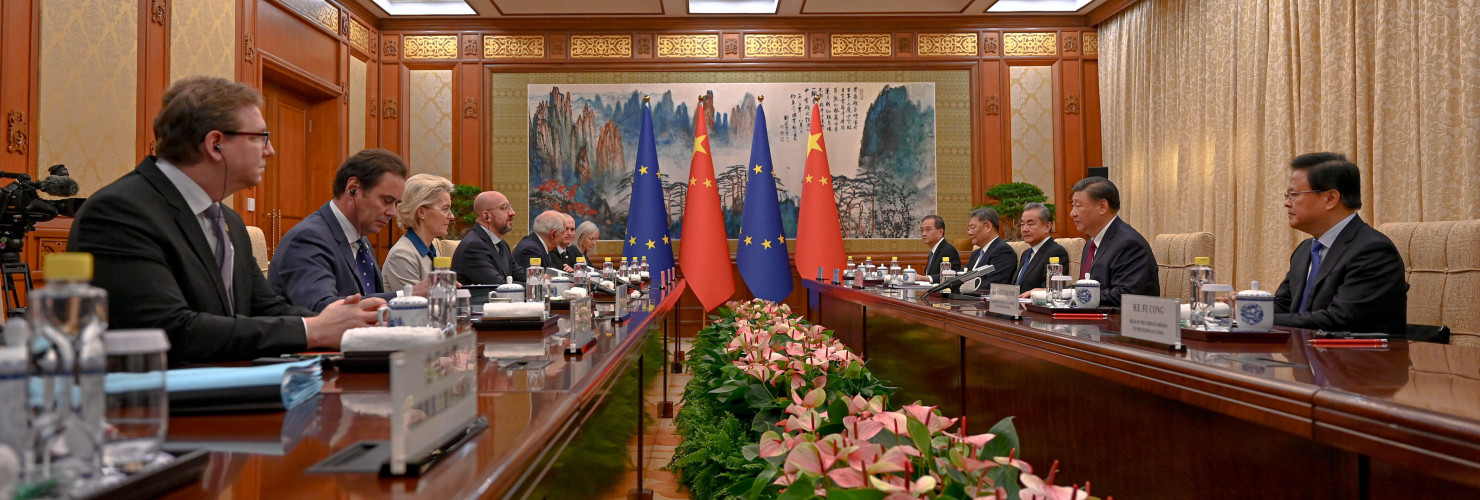

MEPs' key lessons on EU-China policy during the last mandate
The upcoming June European Parliament (EP) elections will shape the political context of EU-China relations for the next five years. The current term-ending mandate has been dominated by building the policy tools and political narrative of a de-risking approach towards China, and the election results will influence Brussels' adherence to this agenda.
Grzegorz Stec, Head of MERICS Brussels Office, invited members from each of the five biggest political groups in the European Parliament to offer advice to the next incumbents by answering the following question:
What are the key lessons learnt from the European Parliament’s work on China policy during the last mandate?
For additional context see “European Parliament elections: How do EP parties see China?” analysis in our last MERICS Europe China 360°.
Iuliu Winkler
MEP (European People’s Party), Vice-Chair of the Committee and Chair of the China Monitoring Group in the International Trade Committee
Mandate 2019-2024: Rapporteur on the EU-China Comprehensive Agreement on Investment and Geographical Indicators (2020)

EU-China affairs remain of key strategic significance. Still, many of our expectations for this mandate have not materialized. We’ve learned that engaging just for the sake of engaging is not enough.
We’ve started this mandate constructively, by ratifying the bilateral geographical indications (GIs) agreement and progressing in the negotiations on the Comprehensive Agreement on Investment (CAI). The scrutiny of CAI was a tough exercise; concerns in terms of impact, proper implementation and enforcement of the otherwise positive steps taken on market access, level playing field and sustainable development were often emphasized in EP debates. A pertinent advice for the next mandate – do not only focus on ambition, focus on implementability and enforcement.
The arrival of sanctions ushered in a period of stagnation, and CAI was taken off the table. Covid-19 and the invasion of Ukraine, alongside the treatment of Lithuania and allegations of espionage, have created further rifts between Brussels and Beijing. Meanwhile, the European Union Chamber of Commerce in China’s yearly reports were getting increasingly worrisome for European business in China.
Recently, we saw more engagement and high-level bilateral visits, yet with very little to show. Trust has been severely damaged in the past years, and serious efforts will be needed to rebuild it. Sectoral agreements could be a start, especially concerning unfair competition and overcapacity. However, we must refrain from charm-diplomacy, and focus on the substance.
Another ever-relevant lesson: more unity is needed on China policy, both between capitals and inter-institutionally in Brussels. The EU could very well use an updated EU-China strategy that must go further than simply reiterating the 2019 consensus, when an EU Strategic Communication labeled China as a partner, competitor and strategic rival.
Raphaël Glucksmann
MEP (Progressive Alliance of Socialists and Democrats), Vice-Chair of Subcommittee on Human Rights
Mandate 2019-2024: Chairman of the INGE Special Committee on foreign interference

I have worked on China from various angles in the EP: trade and economic perspective, the human rights dimension and analyzing Chinese multifaceted interferences in the EU. China’s strategy towards Europe is complex but the main feature is heavy geo-economic coercion. The CCP’s main strategic goal is to deepen our dependency on Chinese production capacity and market, for Beijing to weaponize trade and investment against us.
In Brussels, China lobbyists are not state officials but actually EU multinational companies, whose interests are completely tied to Chinese interests and who fear economic retaliation from Beijing. They are the main hurdles in our crucial endeavors to de-risk and de-couple from China.
This state of play is seriously endangering the EU’s twin transition and economic security. EU trade defense instruments adopted so far are key. Rebalancing our relationship, fighting unfair competition and de-risking European strategic industries are paramount.
To achieve this, the upcoming EP must be very outspoken on China. This house has a major role to play in raising awareness, alerting and showing the way. China is constantly deploying divide and rule tactics, singling out receptive EU Member States and candidate countries and using them as Trojan Horses to undermine the bloc's unity.
In counter to that, the EP must be the EU’s united voice on China. We must ensure that EU instruments are firmly and uniformly implemented and allocated sufficient resources to this end. We must protect citizens’ rights and small businesses’ interests from China’s offensive behaviors. We must force EU leaders to speak the language of power and not shy away from confronting Xi Jinping.
Hilde Vautmans
MEP (Renew), Member of Committee on Foreign Affairs
Mandate 2019-2024: Rapporteur on EP’s reports on “new EU-China Strategy” (2021) and EP’s “Recommendations concerning EU-China relations” (2023)

The number one lesson for me as China rapporteur is that Europe needs to act and speak in a united manner towards China. Otherwise, we risk that China will play member states off against one another, as we have seen the last few years.
Linked to this is that we still lack one EU China strategy. We do have the 2019 Strategic Outlook that described China as “cooperation and negotiating partner, economic competitor and systemic rival.” But this is a factual description, from five years ago. We lack a comprehensive long-term strategy with goals regarding our relationship with China and how to reach them.
This is why in my 2021 report and 2023 recommendations, we call for one EU strategy towards an increasingly assertive and authoritarian PRC, with a clear focus on human rights, the need to speak with one European voice, and de-risking. I welcome the de-risking concept as it rightfully emphasizes that we need to decrease our dependencies and that we need to balance our trade relationship. But this must be followed by concrete measures such as in the Commission’s Economic Security Strategy.
The Commission is increasingly taking the lead in driving the EU’s approach. Now we need a comprehensive and consistent long-term China strategy from the Commission, in consultation with the European Parliament. And we need to make sure that the Council stands behind this strategy and that member states do not play their own game, driven by economic interests. We cannot allow ourselves to be divided towards China.
Reinhard Bütikofer
MEP (Greens/European Free Alliance), Chair of the Delegation for relations with the PRC, Member of Committee on Foreign Affairs

The European Parliament can be a relevant player for the EU’s China policy and its China relations. The five major democratic groups in the European Parliament – EPP, S&D, Renew, Greens/EFA and ECR – developed a consistent collaboration on all issues China. The EP has been able to influence European public opinion on China towards a more realistic perspective. Chinese sanctions against the EP had an adverse effect for Beijing.
The EP is important as a reliable voice on China. Regarding human rights, we particularly addressed crimes against humanity targeting Uyghurs in Xinjiang. The EP showed steadfast solidarity with Hong Kong’s democracy movement against PRC imposed oppression of Hong Kong’s freedoms. The EP developed with great majorities a new Taiwan policy including several important resolutions as well as official Taiwan visits by three committees and two Vice-Presidents. The EP has frequently criticized China’s aggressive external policy, raising issues from the South China Sea to its Belt and Road Initiative, to China’s active support for Russia’s war against Ukraine, and to transborder repression.
The EP should continue to play a constructive role regarding China-related EU legislation. The string of trade defense instruments like the Anti-Coercion Instrument or the anti-forced labor regulation isn’t finite. CAI, which we stopped, must be abandoned for good. The EP must continue support for a proactive EU Indo-Pacific trade policy, for the Global Gateway Initiative, and for the Commission’s economic security policy including industrial policy initiatives like the Chips Act.
This way an EU China policy will gain even more, and a better EP succeeds in building a phalanx of parliaments.
Charlie Weimers
MEP (European Conservatives and Reformists), Member of the Committee on Foreign Affairs
Mandate 2019-2024: Rapporteur on EP report on EU-Taiwan political relations and cooperation (2021)

The biggest lesson is that there can be no return to the pre-2021 relationship with Xi Jinping, let alone the Chinese Communist Party (CCP). Most of the criticism of China in the past has been regarding its repressive internal policies and unfair trade practices. During the previous half decade, we have seen the consequences of China’s external policy: misinformation on the origins of Covid-19, wolf-warrior diplomacy and the Belt and Road Initiative. Most worrying of all, is the regime’s “no limits partnership” with Europe’s greatest geopolitical threat: Russia.
Legislators should also be aware that our firm response to Russian aggression not only benefits Ukraine but Taiwan as well. Beijing was shocked by the intensity of Europe’s response. Both in terms of government actors sending military supplies but also the corporate exodus from Russia. Now the CCP not only has to consider the intensely difficult logistical hurdles of invading Taiwan, but foreign aid and the potential loss of FDI and consumer boycotts.
Finally, in 2021 the European Parliament adopted my report which for the first time focused exclusively on EU-Taiwan relations. The report, which was adopted by a large majority, also urgently called for a Bilateral Investment Agreement (BIA) with the Taiwanese authorities to deepen our bilateral relations. During the course of the next mandate, I would like to see that dream become a reality.

This publication is part of the “Dealing with a Resurgent China” (DWARC) project, which has received funding from the European Union’s Horizon Europe research and innovation programme under grant agreement number 101061700.
Views and opinions expressed are however those of the author(s) only and do not necessarily reflect those of the European Union. Neither the European Union nor the granting authority can be held responsible for them.
